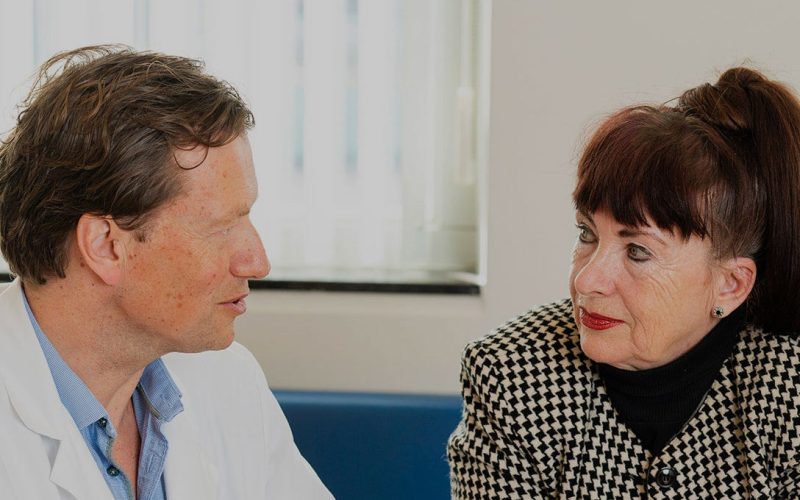Ellen Pauëlsen has dilated carotid arteries. A scan was taken last week to see if the aneurysms have grown or shrunk. Professor of vascular surgery Gert Jan de Borst is a specialist. “Blood thinners also have disadvantages,” he said.
“How are you doing?” asks Gert Jan de Borst. Ellen Pauëlsen (64) from Hollandse Rading is undergoing treatment with him because of a dilation (aneurysm) of the carotid arteries on both sides. Last week she had her annual CT scan to check whether the aneurysms have grown or shrunk in a year, as they can. “It’s going well,” she replied. “I’m happy with the results; everything has remained stable. Still, I occasionally visualize what it looks like inside. Then I feel like I’m carrying a time bomb with me.”
The diagnosis is made about 40 times a year in the Netherlands; patients are on average 47 years old. Since 2014, UMC Utrecht has been an expertise center. A database collects research data from patients worldwide. Gert Jan reassures his patient: “A neck aneurysm usually does not grow and the chance of it rupturing is negligible. Unless there is a genetic predisposition to connective tissue problems. That is not the case with you.” Ellen wonders to what extent blood clots can form. “In carotid aneurysms we almost never see clots,” Gert Jan replies. “Moreover, the dilations in you are relatively small.”
Often the condition is discovered by accident. Such was the case with Ellen. She was suffering from tinnitus, or tinnitus. The ENT doctor took a scan to determine the cause. “I was happy, of course, that I didn’t have a tumor,” she says. “But aneurysms did come to light.” She wonders if an aneurysm could be the cause of tinnitus. “Sometimes it seems like I can hear the blood flowing to the rhythm of my heartbeat,” she says. Gert Jan says this was once investigated in a patient who also suffered from tinnitus. Then a balloon was used to close the carotid artery very briefly. “The patient still heard the ringing,” he says. “So the aneurysm is not the cause.”
“How much does your tinnitus bother you?” asks Gert Jan. “It hinders me regularly,” Ellen says. “It also makes me tired and distracted sometimes.” The ENT doctor has said a hearing aid may help. But she is postponing that decision for a while. According to Ellen, there is also a psychological component. She says: “Yesterday the sun was shining and I went pruning in the garden. I really am an outdoor person. When the birds are singing and the bees are buzzing, it doesn’t bother me as much. Then I am distracted in a nice way.”
Ellen finds it reassuring that she gets scanned once a year. She wonders what happens if the dilation increases. Gert Jan: “We can either remove the aneurysm with surgery in the neck or place a stent. We are doing research to make those stents better and better. To do this, we make a three-dimensional image of the neck of an anonymous patient. We then print a lifelike mold and experiment. Is the newly developed stent flexible and sturdy enough? Will it stay in place? Will no blood clots form during placement?”
Ellen returns to the danger of clotting during a neck dilation. “Shouldn’t I take blood thinners just to be sure? Because if a clot does develop, it might be too late.” Gert Jan explains that blood thinners also have drawbacks. “They can cause bleeding. In your case, we won’t take that risk.” “I feel in good hands,” Ellen says. “But it’s still a little scary. At the same time, you learn to deal with it. More and more I think: oh well, there are much worse things in life.”
